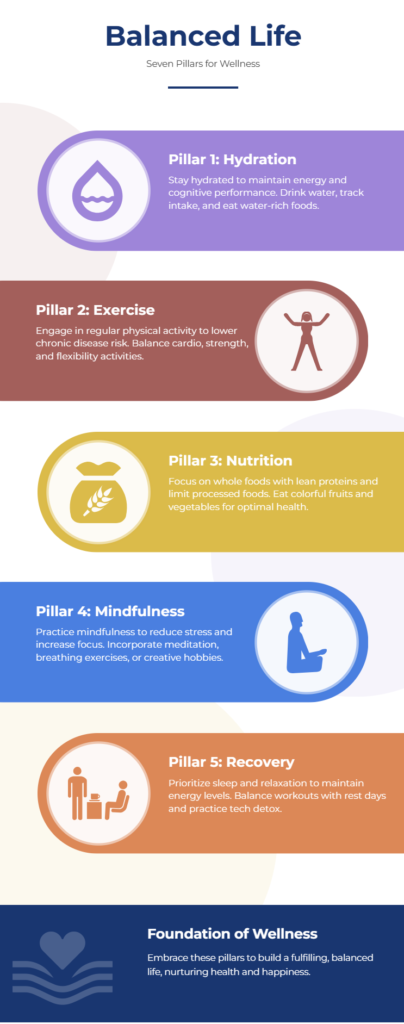Don’t miss a post. Click here to sign up for our free newsletter.
Estimated reading time: 8 minutes
The Seven Pillars of Sustainable Health and Wellness
In the quest for health, happiness, and longevity, taking a balanced approach to well-being is essential. Many of us are constantly searching for that perfect formula to keep our bodies and minds in peak condition, and with the overwhelming amount of health information available, it can be challenging to know where to begin. At Balanced Life Wellness, we believe in focusing on seven essential pillars to create a foundation for a long, active, and fulfilling life. The seven pillars of sustainable health and wellness form the bedrock of our holistic, personalized approach to wellness, helping our clients build habits that support a well-rounded and resilient life.
Let’s dive into these pillars, each backed by scientific insights, practical advice, and encouragement to make sustainable changes. By understanding and nurturing each pillar, you can lay the foundation for a balanced, healthy lifestyle.
Pillar 1: Hydration
Hydration is the unsung hero of wellness, playing a vital role in maintaining everything from energy levels to cognitive performance. The human body is composed of approximately 60% water, underscoring how essential it is to our well-being. Water supports bodily functions such as nutrient transportation, waste removal, and temperature regulation, all of which are critical for daily functioning.
Even mild dehydration can impair your physical and mental performance. A study from the American College of Sports Medicine found that a loss of just 1-2% of body water can lead to diminished cognitive function and fatigue. Ensuring consistent hydration is particularly important as we age, as our sense of thirst can diminish over time, making it harder to stay naturally hydrated.
Tips for Staying Hydrated:
- Aim to drink at least half of your body weight in ounces daily (e.g., a 150-lb person should aim for 75 oz). Check the hydration calculator on our website for a more personalized recommendation.
- Carry a reusable water bottle to make hydrating throughout the day convenient.
- Include water-rich foods like fruits and vegetables in your diet.
Are you tracking your daily water intake? Have you noticed how staying hydrated affects your energy levels? We’d love to hear your experiences.
Pillar 2: Exercise
Exercise is a powerful tool for both body and mind. Regular physical activity is associated with a lower risk of chronic diseases, improved mental health, and increased longevity. According to the CDC, regular physical activity can reduce the risk of cardiovascular disease, Type 2 diabetes, and some cancers, making it one of the most impactful lifestyle habits you can adopt.
Our approach to exercise is focused on balance and sustainability. We work with clients to find activities they enjoy, from strength and endurance training to yoga and outdoor sports, ensuring a well-rounded fitness routine that is easy to maintain. Studies show that incorporating strength training as little as twice a week can increase muscle mass and bone density, which is especially important as we age.
Exercise Variety and Benefits:
- Strength Training: Builds muscle, improves bone density, and supports metabolic health.
- Cardio: Improves heart health and boosts endorphins for mental well-being.
- Flexibility and Balance: Activities like yoga and Tai Chi improve joint health, flexibility, and balance, reducing the risk of falls and injury.
What types of exercise resonate with you? Are there areas you’d like to improve, like balance or strength?
Pillar 3: Nutrition
Nutrition is the fuel that powers our bodies. Eating a balanced diet of whole foods, especially those rich in protein, healthy fats, and complex carbohydrates, helps us maintain energy levels and supports optimal physical and mental health. Protein is particularly important for preserving muscle mass, which can decline with age. According to a study published in the American Journal of Clinical Nutrition, increased protein intake can help prevent muscle loss during weight loss or periods of lower activity.
We emphasize eating whole, unprocessed foods and focusing on balance rather than restriction. Our approach aims to ensure nutrient-rich meals that satisfy hunger and support a healthy metabolism. A balanced diet can not only improve your physical health but also support your mental well-being.
Nutrition Tips:
- Incorporate a source of lean protein in each meal.
- Choose whole grains and a variety of colorful fruits and vegetables.
- Limit highly processed foods and added sugars for optimal health.
How do you balance nutrition in your daily life? What challenges do you face when trying to eat healthier?
Pillar 4: Mindfulness
Mindfulness is the practice of being present and fully engaged in the moment. As life becomes busier and more complex, mindfulness offers a way to reduce stress, increase focus, and cultivate greater contentment. A study from Harvard University found that mindfulness practices can reduce stress levels by about 25% and significantly improve focus and overall life satisfaction.
Incorporating mindfulness into daily life can be as simple as spending a few minutes each day focusing on your breathing, practicing meditation, or engaging in creative activities that bring you joy. We offer guidance on mindfulness techniques such as Ikebana (the Japanese art of flower arrangement), meditation, and art, which provide therapeutic benefits and an opportunity for self-reflection.
Mindfulness Practices to Consider:
- Start with 5-10 minutes of daily meditation.
- Try mindful eating by savoring each bite without distractions.
- Engage in creative hobbies that calm your mind, like painting, gardening, or journaling.
What mindfulness practices resonate with you? How do you make time for mental well-being in your routine?
Pillar 5: Recovery
Recovery is essential for maintaining energy, avoiding burnout, and supporting overall health. The body requires adequate sleep to repair tissues, consolidate memories, and balance hormones. Research from the National Sleep Foundation shows that adults who get 7-9 hours of sleep per night report higher overall satisfaction and experience fewer health issues.
Recovery isn’t only about sleep. It includes time off from work, screen-free breaks, and intentional moments of relaxation. For those who exercise regularly, it’s important to balance workouts with rest days, as recovery helps to repair muscles and prevent injuries.
Strategies for Effective Recovery:
- Aim for consistent, high-quality sleep by maintaining a regular sleep schedule.
- Incorporate a “tech detox” period daily to reduce digital fatigue.
- Practice active recovery after workouts, such as light stretching or walking.
How do you prioritize rest in your routine? Do you have a favorite way to recharge mentally or physically?
Pillar 6: Community and Relationships
Human connection is a powerful determinant of health and longevity. In studying the “Blue Zones,” areas where people live the longest, researchers have found that strong social networks are a common factor among centenarians. A Harvard study also emphasizes that meaningful relationships can improve happiness and protect against mental decline.
Building and nurturing relationships—whether with friends, family, or community members—supports mental health and can even lower stress levels. Community provides a sense of belonging, shared purpose, and mutual support, all of which are fundamental to a fulfilling life.
Ways to Strengthen Relationships:
- Make time for regular social interactions with loved ones.
- Engage in group activities, like local classes, clubs, or volunteer opportunities.
- Cultivate friendships and community connections by attending events and supporting others.
Who are the key people in your support network? How do you stay connected in a way that feels meaningful?
Pillar 7: Rewarding Yourself
Rewarding yourself is essential for motivation and sustainability in any wellness journey. Strict diets or restrictive routines can lead to burnout, so incorporating moments of joy, indulgence, and celebration can keep us engaged and happy. Research on the psychology of habit formation suggests that positive reinforcement, such as rewarding yourself for small wins, significantly boosts adherence to long-term goals.
Rather than focusing on “what not to do,” consider adding enjoyable activities or occasional treats that make the journey more rewarding. Our “80:20” approach encourages moderation and balance—focusing on good habits 80% of the time and allowing for treats or relaxation 20% of the time.
Ways to Reward Yourself:
- Set small milestones and celebrate them with a reward you enjoy.
- Allow yourself indulgent moments within reason to keep things sustainable.
- Reflect on your progress, acknowledging how far you’ve come.
What rewards motivate you to keep going? Do you find balance in your approach to wellness?
Join the Conversation
These seven pillars—hydration, exercise, nutrition, mindfulness, recovery, community, and rewarding yourself—are interconnected and mutually supportive. By investing in each of these areas, you can create a foundation for lasting health, resilience, and happiness. At Balanced Life Wellness, we encourage you to explore each pillar and find balance in a way that suits your lifestyle.
What resonates most with you about the seven pillars? Are there any you struggle with or want to learn more about? Let’s start a discussion! Share your thoughts, ask questions, or share tips that have worked for you.
Subscribe to our free newsletter to receive more health tips right in your inbox, or schedule a free 30-minute 1:1 call for a personal consultation.
The Seven Pillars of Sustainable Health and Wellness | Cheat Sheet

